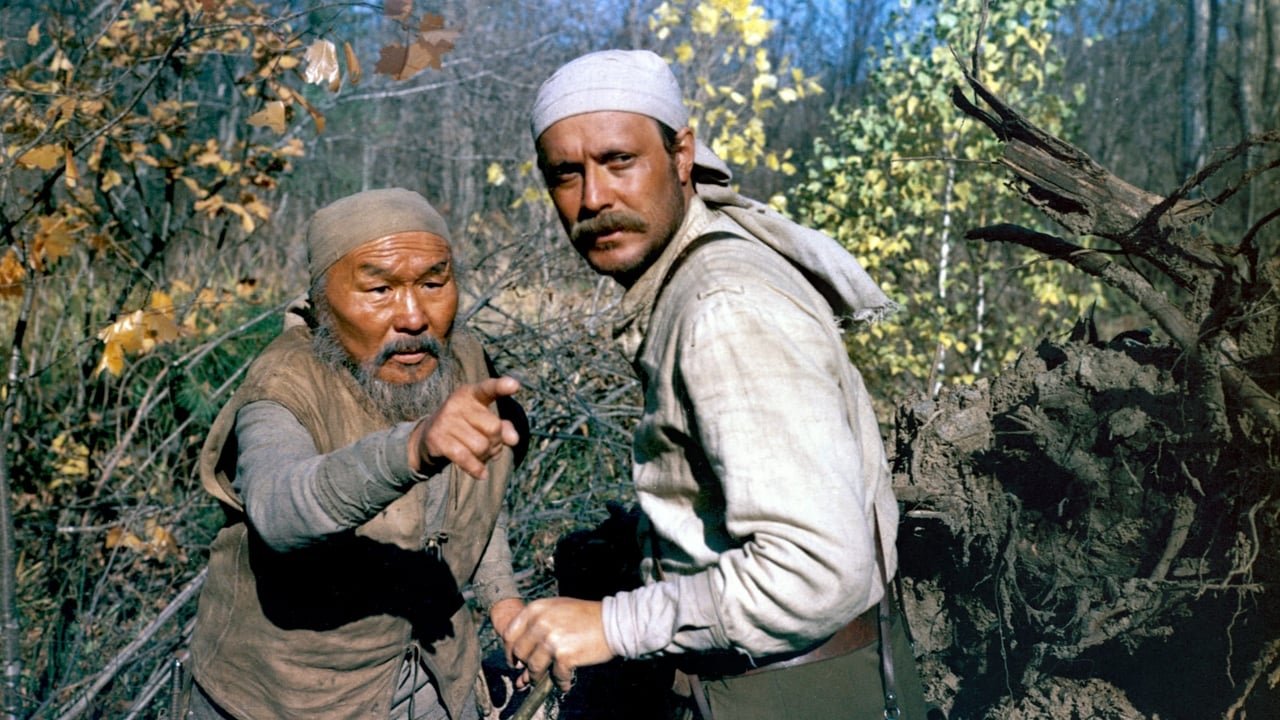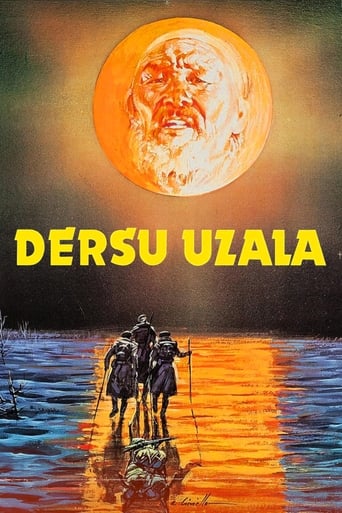filippaberry84
I think this is a new genre that they're all sort of working their way through it and haven't got all the kinks worked out yet but it's a genre that works for me.
Catherina
If you're interested in the topic at hand, you should just watch it and judge yourself because the reviews have gone very biased by people that didn't even watch it and just hate (or love) the creator. I liked it, it was well written, narrated, and directed and it was about a topic that interests me.
Celia
A great movie, one of the best of this year. There was a bit of confusion at one point in the plot, but nothing serious.
Janis
One of the most extraordinary films you will see this year. Take that as you want.
Lee Eisenberg
Akira Kurosawa's breathtaking "Dersu Uzala" looks at a meeting of cultures in pre-revolutionary Russia, as a captain in the czar's army befriends a hunter in Russia's far east. Even as Dersu helps the platoon negotiate the forest and tundra, it is clear that his way of life is dying out as the Russian Empire expands and swallows the indigenous peoples of northeast Asia.The movie has some of the most amazing cinematography. I wouldn't expect a Kurosawa movie to be anything except great, but this movie has to be seen to be believed. There is no description that I can give that will do "Dersu Uzala" justice. It is one of the movies that you must see before you die.
sarnela
When the movie ends and your breath still can't calm down and you want to share what you've just seen with the closest ones... it deserves 10.Definitely not the perfect action/adventure. But I don't suppose it was meant to be such."People", he repeated all the time - "people" were everywhere. People were the soldiers, people were the trees, the fire, the wind, the beasts in the wood...It amazed me enormously the idea of a man so well living with the nature (not "in"), so respecting it that it has been turned into a part of him.A great example of how surviving does not make you necessarily mean and angry man. ...But a truly loving one.
Favog
DERSU UZALA just blew me away. Set prior to the Russian revolution it tells a deceptively simple story of a small band of Russian soldiers on a challenging mission to survey a Siberian wilderness that's forbidding in summer and absolutely treacherous in winter.Fortunately for them, along the way they encounter Derzu Uzala, a little man who lives his life alone, at one with the forest and its creatures, and who agrees to serve as guide for the expedition. He's at one with his surroundings; he refers to animals and plants and stones and everything else in his world as "men;" he's short; he's initially perceived to be a fool but it turns out he's incredibly strong and capable and wise; he can handle a weapon more skillfully than any of the soldiers -- it's almost as though the Force is with him. Yes, I realized when I heard (read) his mangled syntax that Artoo and Threepio clearly weren't the only characters George Lucas lifted from an Akira Kurosawa movie.But that's a side issue. This film is gorgeous and gripping: I was hooked from the opening scene and I hung onto every small thing that happened from then on. And really, in this film only small things happen, but they add up to an epic tale of nature and the ultimate wonder and tragedy of life itself. And it's all set against the backdrop of breathtaking Siberia.My only regret about seeing this wonderfully photographed film is that I didn't see it on a huge screen in a proper movie theater. The Kino DVD transfer just made me sad. There sat the movie on my widescreen TV like a pitiful postage stamp surrounded by an ocean of black border. Sure, I could enlarge the picture to fit side to side, but then the subtitles were chopped off at the bottom. I think Kino could have done better and I hope Criterion will someday give this film the loving care it deserves.
Steffi_P
Sometimes, it is possible to see how a movie director's changing life has impacted on the way in which he or she approaches making a motion picture. Don't worry, I'm not some crazy auteurist; I'm not talking about themes or symbolism, just the changing relationship between the camera and the material. In 1970 Akira Kurosawa suffered the disastrous commercial and critical failure of Dodesukaden, a picture he had poured a lot of his own funds into producing. Soon after this lifelong humanist made what we can assume was an earnest but thankfully unsuccessful suicide attempt. Dersu Uzala was his the picture he made next.Dersu Uzala is often categorised as an anomaly in the Kurosawa filmography anyway, as it was his only feature made outside his native Japan. This adaptation of a Russian explorer's memoir is a potentially serious departure for a director who previously wrote all his own scripts and always seemed to have his finger on the pulse of Japanese society. Still, the wilderness setting and interaction between humanity and landscape in the story ultimately makes this a tale that could be of any time or place. The largely Russian film crew seems particularly in tune with the Japanese director's sensibilities. The musical scoring by Isaak Shvarts has that beautiful haunting quality of Mussorgsky and Rimsky-Korsakov, which Kurosawa would no doubt have appreciated. His long-term director of photography Asakazu Nakai works with a pair of Russian cinematographers to great some wonderful images that have the warm softness of impressionist painting.This last point is particularly important for the late-period Kurosawa. He had long been an accomplished amateur painter, but never has this been more apparent in his film work than in Dersu Uzala. We now see in him a desire to create smooth tonal patterns for the screen, creating compositions that are primarily for aesthetic value, even something as mundane as the shot of sleeping soldiers before they meet Dersu, in which everything is arranged in harmonious diagonals. Howard Hawks once derided the widescreen format as being a bad move because it was a shape rarely chosen by painters, but Kurosawa manages perfectly with it. Painterly his approach may be but it is still cinematic. His frequent use of movement in depth shows his understanding of the frame as a three-dimensional space as oppose to simply a short, wide box. Often a little movement and sound adds to the overall impression, the ripple of water, the crackle of fire and the noises of wind and creatures. With complete control over every element of a shot, Kurosawa is constantly seeking to evoke the might of the forest, its beauty and its mystery.This may be conjecture, but it may be that Kurosawa, shaken by his recent experiences and advancing age, is here taking a step back, unable to connect with fully his subject and humanity in general. After all, painting is generally a solitary pursuit. There are no close-ups in Dersu Uzala, and an unusually low proportion of mid-shots. We are rarely encouraged to focus on facial expressions, and almost always take the place of detached observers, lurking in the bushes. Also contrary to much of Kurosawa's earlier pictures, in which the acting was often flamboyant and hammy, the players here are subdued and realistic – something which incidentally lead players Yuri Solomin and Maxim Munzuk respond especially well to, with Munzuk's performance being incredibly moving at times in its subtle expression. And yet Kurosawa barely allows us to feel as if we know these characters. The physical sense of distance makes us feel like voyeurs on their lives, and while the picture is filled with breathtaking beauty the director's tendency to envelop us in the human warmth of a story has vanished.However as an uplifting postscript, Dersu Uzala was a considerable success, especially at the Russian box office, also gaining recognition elsewhere including an Oscar for Best foreign picture. This veteran director, back from the brink of despair, would soon make some fruitful collaborations with Hollywood producers, and his career would end in a blaze of glory.

